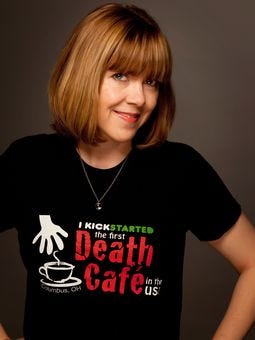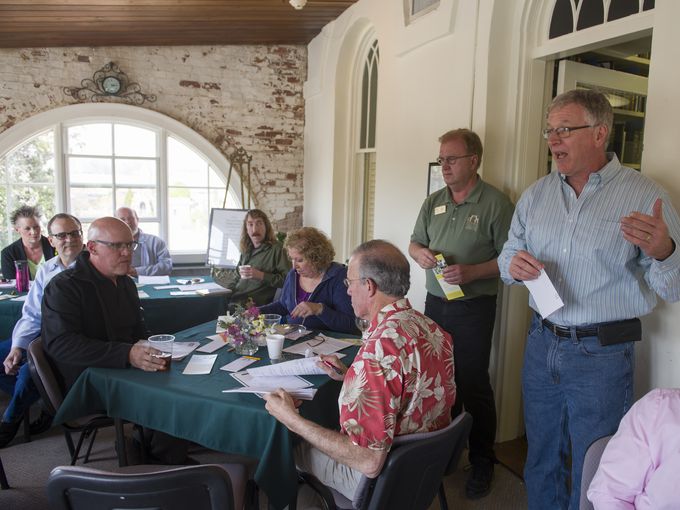‘Death Cafes’ Are Coming To Your City And Funeral Directors Need To Be Involved
In the last few months we have shared multiple articles about ‘Death Cafe‘. Now the concept is spreading widely across the United States and funeral directors need to be involved in the conversation.
Why? Not for a sales pitch, not to convince cafe attendees to pre-plan, not to promote yourself or your funeral home, but to engage in death conversation and answer questions. Pretty simple concept, right?
To many times funeral professionals have a chance to engage in death conversation but the end result is trying to get that person your speaking with to come in and make pre-arrangements. What if you just answered questions and had the conversation? Let that conversation provide enough value that the person seeks out your funeral home on their own.
Get educated on ‘Death Cafes’ and when one is coming to your city. Join in the conversation.
From USA Today:
“Death cafes,” a trend that started in England, are spreading across the USA.
No one wants to talk about death at the dinner table, at a soccer game or at a party, says Lizzy Miles, a social worker in Columbus, Ohio.
But sometimes people need to talk about the “taboo” topic and when that happens, they might not be able to find someone who will listen, she says. “Whenever people hear I’m a hospice worker, they talk to me about death. It doesn’t matter if I’m on an airplane, gambling in Las Vegas, or in a grocery store line. I really see firsthand the need to let people talk. It’s my gift to others.”
Her gift sparked the birth of “death cafes” in the USA, a trend that started in England, is spreading across the USA and is about to take off, she says.
The casual get-togethers are held at coffee shops, restaurants and, on March 30 in Atlanta, at the historic Oakland Cemetery. Hosts are social workers and chaplains — no professional association, philosophy or religion sponsors them, and no one tries to sell anything like coffins or funeral plots.
The concept is really very simple and civilized.
“They’re a place to talk about the issues surrounding death while drinking tea and eating delicious cake,” says Miles, 42.
The Internet is spreading the word. The website Deathcafe.com was created by Jon Underwood, who held the first cafe in September 2011, in England. He developed the idea from the writings of Bernard Crettaz, a Swiss sociologist who says talking about death leads to authenticity. Since 2011, Underwood says, he’s had hundreds of inquiries from the USA, Australia and Canada.
“Death Cafe exists because of a belief that more authenticity is needed in the world,” Underwood says. “Death denial is an omnipresent feature of Western consumer capitalism.”

Meetings often start with the question “What brought you here?” he says.
The conversation helped Julie Arms. “My partner doesn’t want to talk about dying, especially about my dying, so it gave me a chance to explore ideas with other people,” she says. “I found comfort in that.”
Arms, a breast cancer survivor, says other participants understood her when she said, “I don’t think death is nearly as scary after going through cancer.”
“Two other people said the very same thing,” she says. “We have come close to death.”
Putting the cafe in a cemetery setting seemed natural, says LaRocca-Pitts, and one of the participants is a volunteer there and was able to book the room. “We knew we’d have a large turnout and a coffee shop wouldn’t have held us.”
Each cafe is different, he says, but talk can center on advance directive planning, physician-assisted dying, funeral arrangements and what happens after death.
Intensive care units are the most difficult places to have those conversations, he says. “As a hospice chaplain, I know people often don’t talk about these things until it’s a crisis, and there’s little comfort in that.”
But the gatherings don’t draw only people who are worried about dying or those who are grieving. As Underwood noted, they attract people seeking authenticity.
“They’re not being morbid,” he says. “These are people who want to live more fully. They think that by fearing cessation they can’t be spiritually alive. The more we talk about dying and what it means about ego and self, the more we add to life.”
Underwood credits Miles with starting the cafe movement in the USA. She says very soon death cafes will take on a life of their own.
“At the end of April, I’m presenting the cafe concept at the annual conference of the Association for Death Education and Counseling,” she says. “Several other death cafe hosts from the USA will also be there.
“I know many of the people attending will find out about it, hear us talking about it and want to start one.”
[via: USA Today]
Featured image credit: Michael A. Schwarz, USA TODAY




